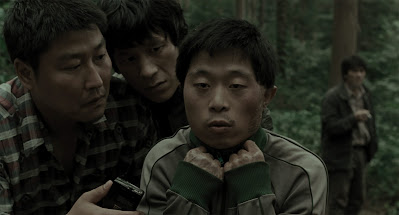REVIEW: Memories of Murder (2003)
In the last two weeks, two related events happened in the United States: one was that a police officer was spooked when an acorn hit his car - he hit the ground, and, terrified, he unloaded his weapon at the acorn; the second was Air Force engineer, Aaron Bushnell, self-immolating in protest of the United States' involvement with Gaza - the responding police officer pulled a gun on him.
Cops only know violence.
This phrase was rattling around in my head on the day that my partner and I unwittingly chose Memories of Murder for our evening film. We're both fans of Bong Joon-ho and Song Kang-ho, but we just happened to have not seen this particular film yet. So down I sat to watch it with the phrase "cops only know violence" in my head. I didn't realize how primed I was for this film.
Set during the 80s in South Korea where a small community was being stalked by the country's first serial killer. The police weren't ready to recognize what they were dealing with. This was a period of time when there were regular protests against the inept and corrupt government, and that ineptitude and corruption seeped all the way down to the police. While the governmental ineptitude is implied, the popular discontent is a constant buzzing throughout the film. The police ineptitude is on full display from the get-go and it spilled over to the general public with how they tormented and even tortured the community in order to "keep the peace."
Cops only know violence.
As it becomes obvious that the murders aren't isolated, a by-the-book detective is brought in from the big city of Seoul, Kim Sang-kyung playing Det. Seo Tae-yoon. He teams up with Song Kang-ho as the local representative (Det. Park Doo-man) with Kim Roi-ha as the third wheel, but no less violent, Det. Cho Yong-koo. We watch them drill down on a possible suspect, the mentally and physically disabled Baek Kwang-ho, played by Park No-shik. Kwang-ho, one of the most vulnerable of this community, is selected as a possible suspect because Doo-man heard a rumor. After being accidentally arresting as he arrived to the community, Tae-yoon watches as Doo-man fabricates evidence to elicit a false confession from Kwang-ho. When that doesn't work, he gets Yong-koo to kick him repeatedly with his boots he kept from his time in the military. They torture this kid until Tae-yoon practically yells at them that evidence shows that Kwang-ho couldn't have been the murderer. Tae-yoon then introduces his one eternal law to our equation:
Documents don't lie.
It then stuck with me that they're at Kwang-ho's family's restaurant and they continue to harass the kid while they're treated like royalty. It reveals so plainly the power dynamics of the community. The newspapers had been called in and Kwang-ho was all but convicted. Tae-yoon gets yelled at publicly for showing the evidence that exonerated this kid. And they're still treated as royalty at the family restaurant.
They follow down a second and finally a third suspect but eventually they turn their sights on Kwang-ho again - this time as a possible witness. He doesn't believe they're there for that, though. He think that they've come to arrest him again. Humiliate him again. Torture him again. In the ensuing chase he injures Yong-koo on his leg with a rusty nail before being confronted by Doo-man at the train tracks. He refuses to go with them. He can't trust them. While blowing a whistle meant for indicating danger he is struck and killed by an oncoming train. Kwang-ho tried to tell them, but the cops wouldn't listen to him before. They couldn't listen to him. Especially him.
Cops only know violence.
We also see Kwang-ho's final revenge as the rusty nail leaves Yong-koo
with tetanus. Due to not treating it, he needs his leg amputated below
the knee. We don't see Yong-koo after the surgery, just his military boots, left behind. He has lost his one tool that made him useful - his brutality. He wasn't the brightest of the bunch but he could kick a man's head in like nothing else. Without that, could he really be a cop anymore?
During this time we see a light shift between Tae-yoon and Doo-man as Tae-yoon becomes obsessive over the third suspect, Park Hae-il playing Park Hyeon-gyu, and Doo-man tries to be a detective instead of a thug. At the finale when there is evidence exonerating Hyeon-gyu and the roles of Doo-man and Tae-yoon have completely gone to the opposite spectrum from before, Tae-yoon mutters "this document lies" and tries to execute the innocent man.
Cops only know violence.
Reading about Bong Joon-ho's thoughts on making this film these words never come up. He's a fan of detective media and was fascinated by the juxtaposition of the beauty of the gorgeous scenery and the ugliness of the grisly remains. This is all there but with his continued track record of being critical to capitalism, imperialism, and the injustices of the world, that seed is there: he enjoyed detective media but didn't shy away from the brutality of it. Bong even indicates through the film that the violence upon the community prevents them from doing their job of stopping this serial killer. It's an incredibly powerful and gorgeous film that will continue to haunt and intrigue me for years to come. I'm glad I finally made time for it.
Who is this movie for: Fans of Korean film in general and fans of Bong Joon-ho in particular for sure. But just as Bong went out to make a love letter to detective films, this scratches that itch for sure.
Why I'd revisit this flick: I absolutely love this film but just from the get go that opening with the remains of the girl hidden among the gorgeous scenery is the exact contrast that Bong Joon-ho was setting out to make. It's the perfect overture to this film.



Comments
Post a Comment